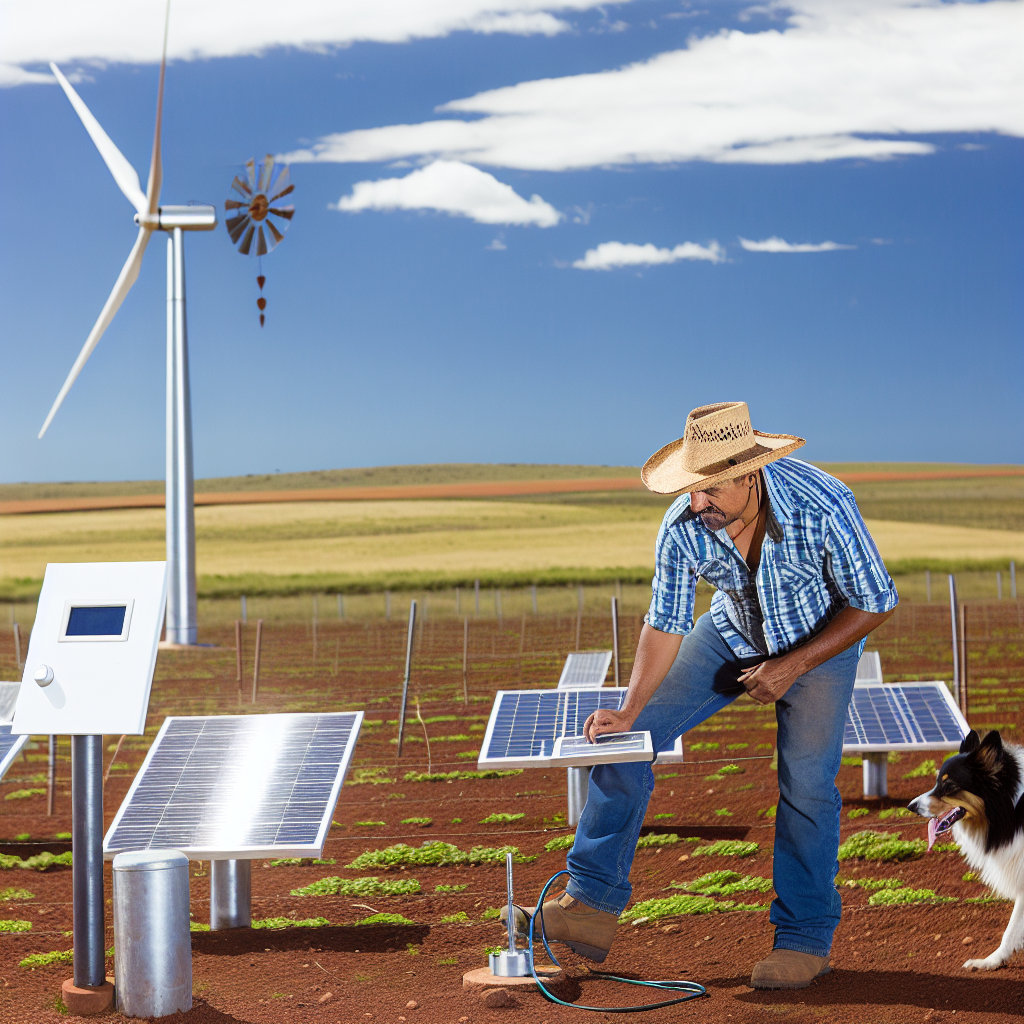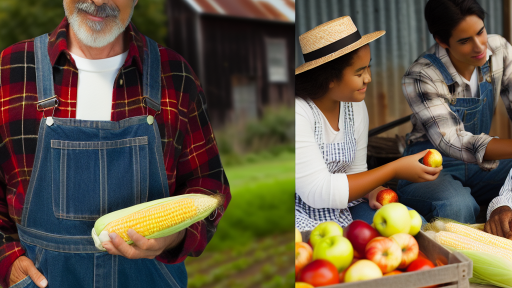Introduction to Renewable Energy and Sustainable Farming
Defining Renewable Energy
Renewable energy comes from natural sources that replenish consistently.
Solar, wind, and hydropower are key examples.
These energy forms reduce dependence on fossil fuels.
Consequently, they lower greenhouse gas emissions.
Understanding Sustainable Farming
Sustainable farming focuses on producing food while preserving environmental health.
This method enhances soil quality and biodiversity.
It also aims to boost economic stability for farmers.
Importantly, sustainable practices seek to satisfy current needs without compromising future ones.
Benefits of Integrating Renewable Energy in Farming
Integrating renewable energy reduces operational costs for farmers.
It provides reliable energy sources for farming operations.
Moreover, using clean energy supports agricultural sustainability.
This shift can also improve community resilience against climate change.
Current Trends in Renewable Energy Use in Agriculture
Farmers increasingly adopt solar panels to power their operations.
Wind turbines are becoming common on large farms.
Additionally, anaerobic digesters convert waste into usable energy.
Transform Your Agribusiness
Unlock your farm's potential with expert advice tailored to your needs. Get actionable steps that drive real results.
Get StartedThese trends indicate a growing commitment to green practices.
Benefits of Renewable Energy Integration in Agriculture
Environmental Sustainability
Integrating renewable energy improves the environmental footprint of farms.
This approach reduces greenhouse gas emissions significantly.
Moreover, it minimizes dependence on fossil fuels.
Renewable sources help in conserving natural resources.
Cost Savings
Using renewable energy can lead to substantial cost reductions.
Farmers can experience lower energy bills over time.
In addition, tax incentives often accompany renewable energy investments.
These savings can be reinvested into the farm’s operations.
Energy Independence
Renewable energy sources enhance energy independence for farms.
Local production means less vulnerability to market fluctuations.
This independence supports stable operational budgets.
Farmers can generate energy on-site, boosting resilience.
Enhanced Productivity
Renewable energy can increase overall farm productivity.
Access to reliable energy supports modern agricultural technologies.
With consistent energy supply, farmers can optimize their operations.
This leads to improved crop yields and livestock management.
Positive Community Impacts
Integrating renewable energy fosters positive community relationships.
Renewable farms often promote local job creation.
Additionally, they serve as educational models for sustainability.
Communities benefit from lower energy costs and cleaner air.
Types of Renewable Energy Sources Suitable for Farms
Solar Energy
Solar energy is a prominent renewable energy source for farms.
Farmers can install solar panels on rooftops or open land.
These installations can provide power for irrigation and equipment.
Showcase Your Farming Business
Publish your professional farming services profile on our blog for a one-time fee of $200 and reach a dedicated audience of farmers and agribusiness owners.
Publish Your ProfileMoreover, solar farms can generate additional income through energy sales.
Wind Energy
Wind energy stands as another viable option for agricultural operations.
Farmers can harness wind by setting up turbines on their land.
Wind turbines can produce electricity to power farm operations efficiently.
Additionally, they can help reduce reliance on fossil fuels.
Biomass Energy
Biomass energy utilizes organic materials for power generation.
Farmers can convert animal waste and crop residues into energy.
This method reduces waste while generating useful energy.
Furthermore, biomass systems can support heating needs on the farm.
Geothermal Energy
Geothermal energy taps into the earth’s internal heat for energy.
Farmers can use geothermal systems for greenhouse heating.
It offers a consistent and reliable energy source throughout the year.
Moreover, geothermal systems can reduce overall energy costs.
Hydropower
Hydropower is applicable for farms near water bodies.
Small-scale hydroelectric systems can generate electricity efficiently.
This can power various farm operations, making them more sustainable.
Also, it can serve as a backup power source during outages.
Integrating Renewable Energy on Farms
Combining multiple renewable sources enhances sustainability.
For instance, farms can pair solar panels with wind turbines.
This integration maximizes energy production and reliability.
Additionally, farmers should assess local energy needs for optimal setups.
Learn More: Effective Water Conservation For Sustainable Agriculture
Case Studies of Successful Renewable Energy Projects in Agriculture
Solar Energy Utilization
Sunny Farms successfully implemented a solar panel system in 2020.
This project covers over 10 acres of their land.
Importantly, it generates 250 megawatt-hours of electricity annually.
As a result, the farm reduced its energy costs by 30%.
Moreover, they sell surplus energy back to the grid.
This initiative also significantly lowered their carbon footprint.
Wind Energy Integration
Green Meadows adopted wind energy in 2019.
The installation of wind turbines allows them to harness strong winds.
Consequently, they meet 80% of their energy needs from this source.
They also contribute to local energy supply, boosting community resilience.
This sustainability effort improved their public image.
Farmers reported increased interest from eco-conscious customers.
Biogas Production
Farm Fresh began utilizing biogas technology in 2021.
This process uses organic waste from livestock operations.
They produce biogas for cooking and heating purposes.
This practice reduces their reliance on fossil fuels.
Additionally, the leftover slurry serves as a nutrient-rich fertilizer.
This closed-loop system exemplifies effective waste management.
Showcase Your Farming Business
Publish your professional farming services profile on our blog for a one-time fee of $200 and reach a dedicated audience of farmers and agribusiness owners.
Publish Your ProfileHydropower Projects
Mountain Valley Farms launched a small-scale hydropower project in 2022.
They capitalized on a nearby stream to generate electricity.
This system now provides 100% of the farm’s energy needs.
Furthermore, it supports irrigation systems during dry spells.
Their sustainable practices attracted funding from green initiatives.
Consequently, they expanded operations and improved overall productivity.
Community Wind Farm Initiative
Rural Hope Farms initiated a community wind farm project.
This cooperative approach involves several local farms.
They collectively invested in large wind turbines.
Thus, they create a sustainable energy source for their area.
Profits are shared among the participating farms.
This collaboration fosters community spirit and resilience.
You Might Also Like: Effective Social Media Strategies for Farm Sales
Challenges in Implementing Renewable Energy on Farms
High Initial Costs
Many farmers face significant upfront costs for renewable energy systems.
Solar panels and wind turbines require substantial investments.
Unfortunately, high costs deter some farmers from adopting these technologies.
Access to financing options often remains limited for small farms.
Technical Expertise
Implementing renewable energy involves complex technologies.
Farmers may lack the necessary technical skills to install and maintain systems.
Moreover, limited access to training and resources exacerbates this issue.
Intermittent Energy Supply
Renewable energy sources are not always reliable.
Weather conditions can significantly impact energy production.
This unpredictability makes planning challenging for farmers.
Farmers need efficient energy storage solutions to manage variability.
Regulatory Hurdles
Farmers often navigate complex regulations regarding energy production.
Permits and inspections can slow down the implementation process.
Additionally, various state and federal policies can complicate compliance.
Integration with Existing Systems
Many farms operate on established energy systems.
Integrating new renewable technologies can disrupt existing operations.
Farmers must ensure compatibility with their current energy sources.
Community Acceptance
Community attitudes toward renewable energy can vary significantly.
Some local residents may oppose new installations due to aesthetic concerns.
Farmers must engage and educate their communities to build support.
Gain More Insights: Seasonal Eating: A Guide for Modern Farmers

Technological Innovations Supporting Renewable Energy Use
Solar Energy Technologies
Solar panels convert sunlight into electricity efficiently.
Farmers can utilize roof spaces for solar installations.
This setup reduces reliance on non-renewable energy sources.
Moreover, excess energy can be sold back to the grid.
Wind Energy Solutions
Wind turbines can generate power in open farm areas.
They use wind currents to produce sustainable energy.
Showcase Your Farming Business
Publish your professional farming services profile on our blog for a one-time fee of $200 and reach a dedicated audience of farmers and agribusiness owners.
Publish Your ProfileFarmers can benefit from incentives to install wind turbines.
Additionally, wind energy systems often have low maintenance costs.
Biogas Production
Biogas systems convert organic waste into energy.
This process helps manage waste effectively on farms.
Farmers can power their operations with biogas-generated electricity.
Furthermore, the leftover digestate acts as a nutrient-rich fertilizer.
Energy Storage Innovations
Advanced battery systems store renewable energy for later use.
Farmers can use stored energy during peak demand times.
This capability enhances energy independence and reliability.
It also contributes to more efficient energy management on farms.
Smart Grid Technologies
Smart grids optimize energy distribution and usage.
They allow farmers to monitor energy consumption in real time.
This technology supports informed decision-making regarding energy use.
Moreover, it can facilitate integration with renewable energy resources.
Find Out More: Urban Farming Techniques for Small Space Farms
Policy Framework and Incentives for Renewable Energy in Agriculture
Current Policies Supporting Renewable Energy
Various policies foster renewable energy use in agriculture.
The Renewable Energy Directive sets ambitious targets for renewable energy consumption.
Additionally, the USDA offers programs that promote energy efficiency.
These initiatives help farmers reduce energy costs and promote sustainability.
Incentives for Farmers Adopting Renewable Technologies
Farmers can benefit from numerous financial incentives for implementing renewable energy solutions.
Grants and tax credits increase the affordability of solar and wind technologies.
Moreover, state-level programs often provide additional funding opportunities.
Impact of Government Support on Renewable Energy Adoption
Government support significantly influences renewable energy adoption in farming.
Subsidized loans help farmers access necessary funding for renewable projects.
As a result, many farms invest in wind turbines and solar panels.
This investment leads to reduced greenhouse gas emissions over time.
Case Studies of Successful Integration
Many farms showcase successful renewable energy integration.
The Smith Family Farm utilizes solar panels to power their operations.
Consequently, they have achieved energy independence while saving on utility bills.
Similarly, Green Valley Farms employs wind energy to power irrigation systems.
This approach has significantly minimized their reliance on fossil fuels.
Future Policy Directions
The future requires policies that continue to support renewable energy in agriculture.
Establishing long-term funding goals will encourage sustainable farming practices.
Expanding incentives will further increase farmer participation in renewable energy initiatives.
Ultimately, a robust policy framework can transform the agricultural landscape.
Future Trends in Renewable Energy Adoption Among Farmers
Increasing Interest in Solar Energy
More farmers will turn to solar energy systems in the coming years.
This trend stems from decreasing costs and improving technology.
Solar panels now offer better efficiency and storage options.
Additionally, government incentives encourage solar energy adoption.
Ultimately, this shift will enhance farm sustainability and profitability.
Showcase Your Farming Business
Publish your professional farming services profile on our blog for a one-time fee of $200 and reach a dedicated audience of farmers and agribusiness owners.
Publish Your ProfileWind Energy Potential
Farmers are exploring wind energy as a viable option.
Areas with consistent wind patterns attract attention from agriculturalists.
Wind turbines can provide significant energy savings and revenue opportunities.
Moreover, local communities benefit from job creation linked to wind farms.
This renewable resource complements existing agricultural operations beautifully.
Biogas Production Expansion
Biogas production is gaining momentum among farms worldwide.
Farmers can convert animal waste into renewable energy efficiently.
This process reduces greenhouse gas emissions significantly.
Furthermore, utilizing biogas helps manage waste more sustainably.
Many farms see biogas as a reliable energy solution for operations.
Integration of Battery Storage Solutions
Battery storage technology will play a crucial role in energy management.
Farmers will invest in batteries to store excess energy for later use.
This approach maximizes the benefits of solar and wind systems.
Consequently, it provides stability against fluctuating energy prices.
Advanced storage will enhance energy independence significantly.
Government Policy Influence
Policy initiatives will shape the future of renewable energy in agriculture.
Farmers will benefit from subsidies and grants promoting clean energy.
Moreover, regulations aimed at reducing carbon footprints will drive change.
As legislation evolves, farmers will adapt their practices accordingly.
This alignment with policy will foster sustainable farming for future generations.
Collaborative Approaches to Renewable Energy
Farmers will increasingly collaborate on renewable energy projects.
Joint ventures can lower initial investment costs significantly.
Shared energy resources improve access to technology and expertise.
Such partnerships will facilitate sustainable energy practices widely.
Ultimately, collaboration will strengthen community ties and resilience.




